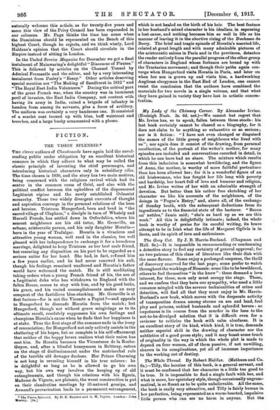FICTION.
THE VISION SPLENDID.*
THE clever authors of Chantemerle have again laid the novel- reading public under obligation by an excellent historical romance in which they adhere to what may be called the classic principle of inventing the chief personages, and introducing historical characters only in subsidiary roles. The time chosen is 1830, and the story has two main motives, being concerned with the religious revival which had its centre in the common room of Oriel, and also with the political conflict between the upholders of the dispossessed Legitimist regime and the newly established Oilettnist monarchy. These two widely divergent currents of thought and aspiration converge in the personal relations of the hero and heroine. Tristram Hungerford, born and bred in "the sacred village of Clapham," a disciple in turn of Whately and Harrell Fronde, has settled down in Oxfordshire, where his nearest neighbours are his old tutor, Mr. Grenville, an urbane, aristocratic parson, and his only daughter Horatia- born in the year of Trafalgar. Horatia is a vivacious and attractive young woman, well read in the classics, too well pleased with her independence to exchange it for a humdrum marriage, delighted to keep Tristram as her best male friend, but resenting any disposition on his part to be regarded as a serious suitor for her hand. She had, in fact, refused him a few years earlier, and he had never renewed his suit, though his feelings remained unaltered and Horatia's father would have welcomed the match. He is still meditating taking orders when a young French friend of his, the son of a Legitimist duke who has withdrawn to England with the fallen House, comes to stay with him, and by his good looks, his grace, and his varied accomplishments makes an easy conquest of the fastidious blue-stocking. Mr. Grenville is at first furious—for is not the Vicomte a Papist P—and appeals to Hungerford. to dissuade Horatia from the match ; but Hnugerford, though not without grave misgivings as to its ultimate result, resolutely suppresses his own feelings and champions Horatia's cause when he finds that her happiness is at stake. Thus the first stage of the romance ends in the irony of renunciation; for Hungerford not only actively assists in the shattering of his hopes, but so complete is his self-effacemeqt that neither of the happy lovers realizes what their union has cost him. So Horatia becomes the Vicomtesse de la Roche- Guyon, and, after a blissful honeymoon in Brittany, enters on the stage of disillusionment under the matriarchal rule of the terrible old dowager duchess. Her Prince Charming is not long in revealing himself in his true colours : he is delightful so long as be is allowed to go his own way, but his own way involves the keeping up of old entanglements, and though his relations with his Egeria, Madame de Vigerie, are platonic, the worst construction is put on their clandestine meetings by ill-natured gossips, and Artnand's prevarication leads to a permanent estrangement, • Ttta Vision Splendid. By I). K. Eroster and G. W. Taylor. London : John Murray. L68.3
which is not healed on the birth of his heir. The best feature in her husband's mixed character is his idealism, in espousing a lost cause, and nothing becomes him so well in life as his manner of leaving it in the abortive rising of the Duchesse de Berry. The brief and tragic episode of Horatia's married life, related at great length and with many admirable pictures of the aristocratic salons in Paris and in the provinces, detaches the reader entirely from the parallel progress of the other group of characters in England whose fortunes are bound up with the Tractarian movement; and though their paths again con- verge when Hungerford visits Horatia in Paris, and later on. when her son is grown up and visits him, a hardworking Anglican clergyman in the East End of London, one cannot resist the conclusion that the authors have combined the materials for two novels in a single volume, and that what they have gained in variety they have lost in artistic concen- tration.


































































 Previous page
Previous page